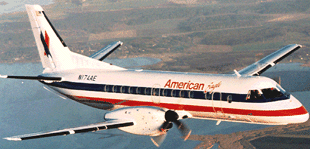
July 26, 2000, EULESS, TX – "The pilots of American Eagle deeply resent the recent decision by management to deny them the ability to operate 70-seat jets that are on order and previously committed to be flown by American Eagle pilots. "The pilots of American Eagle believed in good faith that as a part of signing a 16-year contract, they would perform 50 and 70-seat jet flying. The 16-year contract that governs the working relationship between the pilots and management—negotiated some four years ago—sacrificed future abilities to determine rates of pay and to exercise the most basic of union rights: The right to strike.

These sacrifices were made only because management said it was necessary if the four carriers were to be combined and share equally in the ability to fly—and more importantly to earn the incomes provided by—the 50 and 70-seat jets. To accommodate management, the pilots of American Eagle gave their corporation something much sought after, but seldom achieved, by managements in the airline industry: long-term labor stability with pay raises determined by other smaller, regional airlines, and no ability to strike. The pilots were told that this was the dawn of a "new" relationship between the American Eagle pilots and management.
"Now it is learned that, as part of an effort to repair the relationship between the American Airlines pilots and their management, the American Eagle pilots will lose the ability to fly the 70-seat jets. "A small but ever-increasing group of American Eagle pilots has exercised their option to serve out the remainder of their careers at American Eagle. Many did this based on the ability to earn the pay rates offered by the 70-seat jet. They do not now have the opportunity to revisit their career decision, nor will they soon have the opportunity to fly the 70-seat jet. "The pilots of American Eagle regret that management intends to deny them the opportunity to fly the 70-seat jet and, more importantly, earn the pay rates that this aircraft would provide. News media accounts abound describing the plight of American Eagle pilots: They work for pay rates that are much less than their counterparts at American Airlines. As such, the 70-seat jet would have provided economic opportunities vitally needed for the pilots of American Eagle and their families.
"In 1997, the management of AMR went to great lengths to defend the ability of American Eagle pilots to fly the 70-seat jets because American Eagle can more profitably fly this type of equipment than American Airlines. Now, assuming American Airlines flies the 70-seat regional jet, the carrier will do so at a greater unit cost. "This raises questions in the minds of American Eagle pilots: Do we really need this management-created, artificial barrier between the two airlines of AMR? Is management best serving the shareholders' interests when it erects barriers to the ability to efficiently and profitably deploy equipment in whatever way the marketplace dictates?
"The pilots of American Eagle believe that the time has come for management to tear down this self-imposed barrier. American Eagle and American Airlines should be combined in a manner that allows management to effectively serve existing markets, pioneer new markets, develop hub-bypass capability, and profitably serve long and thin routes. This would benefit the shareholder and end the whipsawing of separate labor groups by management, which, in turn, provides an atmosphere of security and advancement for all labor groups. In this environment, employees can focus on how to best serve their passengers, and worry less about whether they will be the latest sacrifice in fence mending efforts by management.
"It should be emphasized that the pilots of American Eagle do not blame the pilots of American Airlines for attempting to secure and enhance their flying. What the pilots of American Eagle find most objectionable is the management-created atmosphere wherein one labor group must lose for another to gain. The pilots of American Airlines organized to prevent the occurrence on their property of what just occurred at American Eagle. "This is a lesson in AMR management practice that will be taken into account in future dealings between American Eagle pilots and management. AMR should realize that this whipsaw approach is a throwback to the management styles of the last millennium, and must be eliminated.
| ŠAvStop Online Magazine Contact Us Return To News |